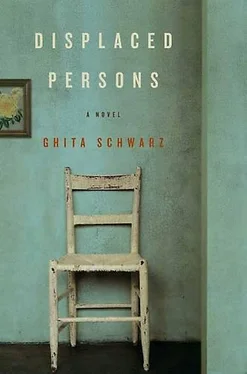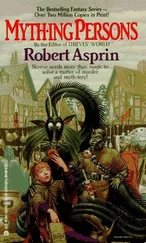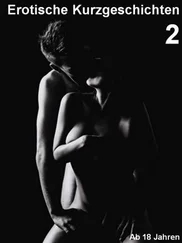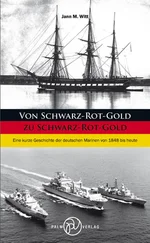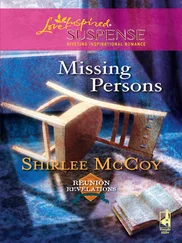The office was plain, as he remembered it from Hinda’s wedding three years ago. A large desk, of course, a secretary sitting outside, typing on a typewriter that made little squeaks as her fingers hit the keys, a broad window, room for some dozen people to sit, but only two or three plain, wooden chairs. Pavel was glad that the office of the leader of the Jews was spare, like an old synagogue, where one came to inscribe one’s name in the books, even if here the books were the lists of those going to America, Australia, Canada. To Palestine, Israel, it was now easier to go, of course. But the scarcity there-it made Pavel shudder to think of Chaim alone there, laboring in the fields-Pavel wanted to wait for something good, for a good life for his child, his children, he would have children, like the plump ones born every week in the camp, born of marriages made quickly, the noise of infants and even older ones crowding out the quiet.
Yidl extended his hand. Then sat down in the chair in front of his desk, next to Pavel’s, and said, leaning into Pavel’s face, I know why you are here.
Yes, said Pavel. I told your assistant to let you know-
You know the man in the American jail. The Jewish man.
Pavel shifted his eyes. Yes.
Do you know anything good? Anything that might help us?
Pavel looked at Yidl: truthfully, no.
Truthfully?
Pavel pulled himself up, a little offended. I do not bear false witness.
There was silence. Then Pavel said, Still, as I said, I could talk to him-I could see if he-if he felt remorse-and then, if that were the case-
Tomorrow, Yidl said, I have a meeting with some of our representatives at the immigration committee. So! I cannot go tomorrow. But a delegation is to go down on Sunday. Myself, and Norbert, of course, perhaps two others. Come with us.
BUSINESS, PAVEL HAD SAID to Fela. Business. And it was true that he was to meet Marek to arrange a contract afterward. But he could see she knew it was something else. Germans did not do so much business on Sundays. Better this way, he had insisted, though she had said nothing. No one notices what we are doing, not on Sundays.
Yet Pavel thought the American soldiers could not help noticing the committee members disembarking from the long car hired by Yidl. They were small men-but for Norbert, Yidl’s second in command-small in comparison to the soldiers, but dignified, their bodies stiff, their faces calm and accusatory. Pavel’s cap remained firm over his curled black hair, his jacket was smooth, his shirt pressed. As they entered the jail of the Bremen zone-just a barracks office with a small row of locked rooms-Pavel felt himself to be a soldier, a peace soldier, perhaps, unarmed, but part of a large, disciplined whole.
In the bare room to which the group was led, Yidl announced: This is good.
Norbert nodded.
Yes, repeated Yidl, pulling a chair from the wooden table and motioning for the others to sit as well. This is good.
The door opened: Kresser entered.
Pavel stood. It was him. Fatter, of course, and perhaps more stooped. Still, it was the same man, with large green eyes and dark hair, olive skin, the wide mouth that spat. Pavel felt his blood knocking in his ears. Fear? But how could it be? It was not Pavel who was the prisoner. Still, his body felt tight, filled with a desperate attention.
The rest of them betrayed nothing; perhaps they felt nothing. They did not know him, this Kresser. Yidl too remained sitting. Do you know who I am?
Ah, yes, said Kresser, his voice clear, unwavering. The King of the Jews.
If you like, responded Yidl. We are here to speak with you.
Kresser lifted his brows, looked from one to the other.
Who we have here, declared Yidl, who we have here is a witness.
They all looked at Pavel: Pavel knew he was to speak. But what could he say? The man’s dark skin seemed loose on his cheek, on his neck. Yet he could not be old. Perhaps five years older than Pavel. Kresser, he managed at last. Do you remember me?
Kresser looked at him in the face, then turned again to Yidl and shrugged.
No? cried Pavel. For how well Pavel remembered Kresser, the pound of his boot on his back, his head. But then he thought: What to me was a boot, to him was a shoe. Something to keep his foot warm. Pavel repeated, more quietly: No?
I did not say no, I did not say yes.
Yidl gave a look to Norbert and the two others. Let us leave Pan Mandl with the prisoner.
KRESSER, PAVEL FINALLY SAID. He had sat down again, with Kresser across. You may not remember us, but there are many who remember you. He spoke in Yiddish.
Me? said Kresser. Am I something to remember? His eyes were on his hands, wide hands. But he too spoke in Yiddish: the American soldier would not understand.
Yes, said Pavel. You are something to remember-you-He paused. To me, you-what you did-
Kresser waited.
The image in Pavel’s head, the tight feeling in his arm and back, the memory of a terrible smell-it was the smell that he still could not wipe out from his body-all rose up in him and crowded his mouth. Pavel swallowed and felt the sourness recede back into his belly.
At last Pavel continued: Very many. There are very many who remember you. Already I have met two men, three men, who are ready, more than ready, to testify.
I suppose I must be important, Kresser muttered. As important as the others, yes?
Yes, to us, yes, Pavel said, a sudden hope pushing at his voice.
So, said Kresser.
So! answered Pavel. Tell me.
Then Pavel paused. Tell what? he suddenly wondered. Kresser waited also, a thin smile on his lips.
Tell me, repeated Pavel. Are you not sorry? Are you not-Pavel searched for another word, but could not find one-are you not sorry?
What I am, said Kresser, is finished.
Pavel thought to himself: I do not bear false witness. But he said: Kresser, Kresser, think. Think. If you tell me, just a phrase, just a word of the remorse you feel, I will say something for you.
There is nothing anyone can do for me, said Kresser. I told you what I told you. I am finished.
Consider it, said Pavel. Consider what a trial will do to all of us. Not just to you. After all the pain you have caused, can you not find a way to stop the scandal now? How much easier if we avoided it. I would help you. Pavel paused, gave him a significant look. I would help you! Consider it.
Kresser looked at him, opened his mouth as if to laugh. But he did not laugh. Yes, he said. His voice was different: cheerful and inflected. Yes. I will consider it.
Kresser stood up. He was ending the visit. The muscles in Pavel’s neck tightened. There was something he should say, one more thing that could escape his lips, to convince Kresser, to make him understand, but the words would not come. At last Pavel stood up himself, and the American boy accompanied him out of the room, leaving Kresser alone.
HE HAD DONE WHAT he could, Pavel thought while waiting for Marek to answer the door. He had done what he could. But the worry inside him did not subside. Only three years ago he would have testified with enthusiasm and vigor in a public court against Kresser. Now everything was different. It was important for the record to be clear. It was important for those who were left not to be stained. But sometimes there was nothing one could do.
He should push it aside. Worry for yourself! Fela had said. But he had. Already this morning Yidl had mentioned a new list he was forwarding to the Joint for their assistance, and Pavel had understood from the look Yidl had given him-a quick glance, but serious-that Pavel and Fela would be on it. So! Hinda would not be alone there with her husband and child. If this turned out. Yes, he had worried for himself, and his wife, and his child-to-be. It did not mean he would not try to contribute.
Читать дальше
